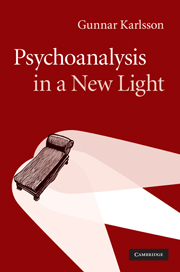Book contents
- Frontmatter
- Contents
- Preface
- Acknowledgements
- List of figures
- 1 Phenomenology and psychoanalysis
- 2 The life-world as the ground for sciences
- 3 A critical examination of neuropsychoanalysis
- 4 The conceptualization of the psychical in psychoanalysis
- 5 The libido as the core of the unconscious
- 6 The grounding of libido in the life-world experience
- 7 Beyond the pleasure principle: the affirmation of existence
- 8 The question of truth claims in psychoanalysis
- Concluding remarks
- References
- Index
7 - Beyond the pleasure principle: the affirmation of existence
Published online by Cambridge University Press: 05 June 2012
- Frontmatter
- Contents
- Preface
- Acknowledgements
- List of figures
- 1 Phenomenology and psychoanalysis
- 2 The life-world as the ground for sciences
- 3 A critical examination of neuropsychoanalysis
- 4 The conceptualization of the psychical in psychoanalysis
- 5 The libido as the core of the unconscious
- 6 The grounding of libido in the life-world experience
- 7 Beyond the pleasure principle: the affirmation of existence
- 8 The question of truth claims in psychoanalysis
- Concluding remarks
- References
- Index
Summary
Freud's essay Beyond the pleasure principle (1920) has gone down in history as one of the most important works in psychoanalysis, since his idea of a death drive is presented there for the first time. I have already touched on the concept of the death drive in preceding chapters, and, in accordance with Laplanche's original interpretation, paid attention to the death drive as the most untamed and uncivilized in the libido – as the bottom layer of the libido.
My intention in this chapter is not to go on discussing the death drive as a part of the libido; here, rather, I would like to enlighten another interpretation that Freud's essay awakens. This interpretation has to do with pre-sexual conditions of the unconscious, as discussed in chapter 4. I thus want to underline this thought by means of Freud's ideas presented in Beyond the pleasure principle. I mentioned several psychoanalysts in chapter 4, whose ideas imply that the Freudian unconscious, ruled by the pleasure principle, presupposes another kind of psychical process.
Freud's concept of the death drive has given rise to much controversy and to many different interpretations. It is in fact already possible to discern two diametrically opposite meanings of this concept in his essay. I will in this chapter argue that both these meanings are relevant in describing psychical life, although only one of them actually qualifies as the concept ‘death drive’.
- Type
- Chapter
- Information
- Psychoanalysis in a New Light , pp. 143 - 161Publisher: Cambridge University PressPrint publication year: 2010



